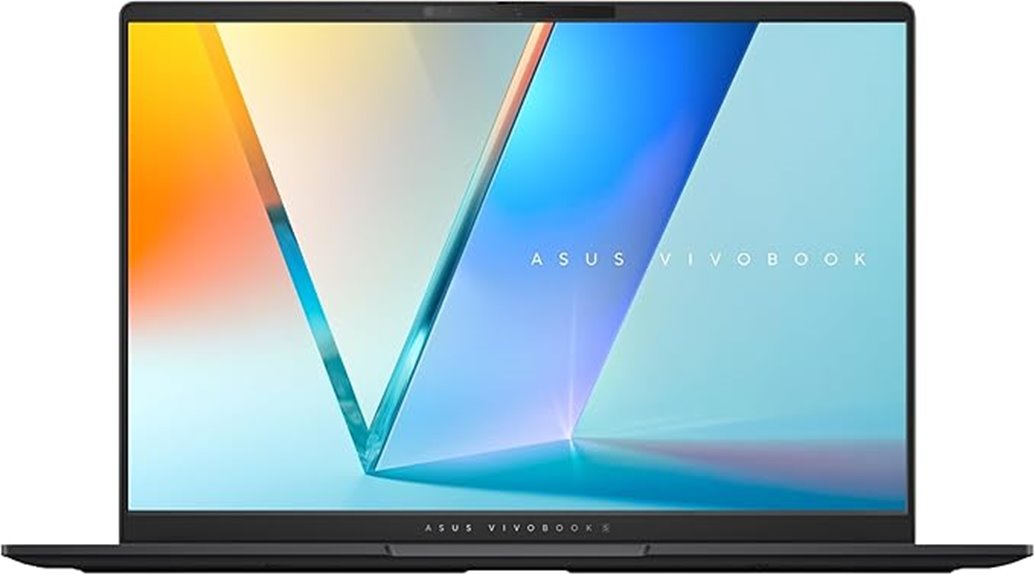Best Laptops for Data Scientists (Top 5 Picks for 2025)
If you’re seeking the best laptops for data scientists in 2025, look for those with powerful GPUs, like the NVIDIA RTX series, and sufficient RAM of at least 16GB. A solid 512GB SSD is essential for fast data access. Keep display quality in mind; a high-resolution screen enhances visualizations. Battery life is crucial, too—aim for 8 to 18 hours on a lightweight machine. Stay tuned to discover five top contenders that excel in power and performance.
In the interest of full disclosure, we would like to inform you that some links on our website are affiliate links. By clicking on these links and completing a purchase from our partners, we may receive a nominal commission at no extra cost to you. Rest assured, our affiliate partnerships do not compromise the integrity of our editorial content or product evaluations. For further clarification, kindly refer to our comprehensive affiliate disclosure.
Table of Contents
What Are the Best Laptops for Data Scientists to Buy This Year?
Here are my top picks for the best laptops for data scientists, you can consider this year.
Apple MacBook Pro Laptop with M4 Chip (14.2-inch, 16GB RAM, 512GB SSD)
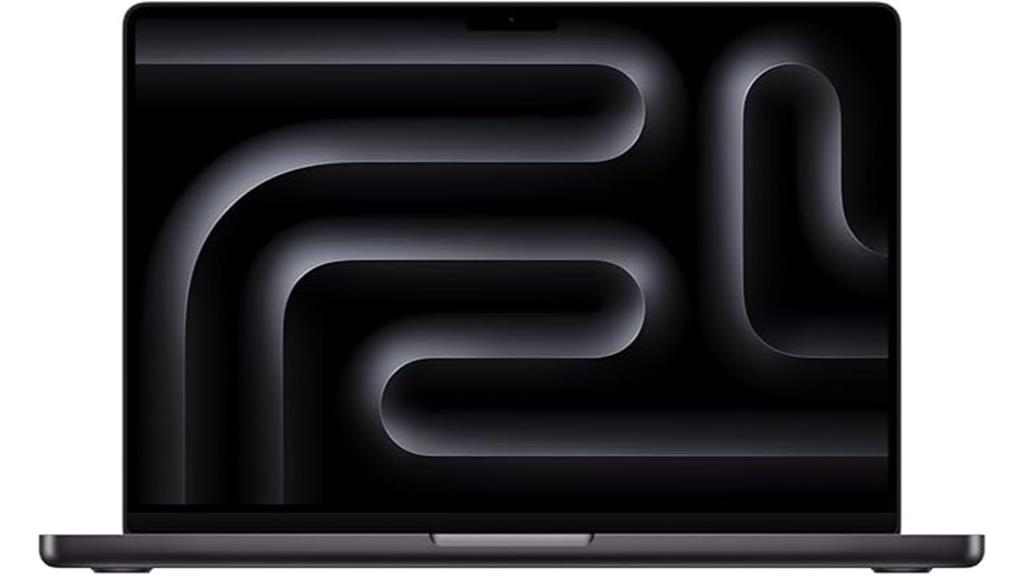
If you’re a data scientist seeking a powerful and efficient laptop, the Apple 2024 MacBook Pro with the M4 chip is an excellent choice. With its 10-core CPU and GPU, you’ll experience exceptional speed for multitasking and running demanding apps. The 14.2-inch Liquid Retina XDR display offers stunning visuals, boasting 1600 nits peak brightness and a remarkable contrast ratio of 1,000,000:1. Plus, with 16GB of unified memory and a 512GB SSD, you’ll have plenty of space and performance for your projects. Its seamless integration with other Apple devices enhances your workflow, making it a perfect fit for your needs.
Best For: Data scientists and professionals who require a powerful, efficient laptop for multitasking and demanding applications.
Pros:
- Exceptional performance with the M4 chip’s 10-core CPU and GPU for seamless multitasking.
- Stunning 14.2-inch Liquid Retina XDR display with outstanding brightness and contrast for high-quality visuals.
- Strong integration with the Apple ecosystem, enhancing productivity and workflow.
Cons:
- Higher price point compared to other laptops with similar specs.
- Limited upgrade options for RAM and storage post-purchase.
- May not support certain specialized software not optimized for macOS.
Acer Swift X 14 Laptop (SFX14-72G-77NJ)
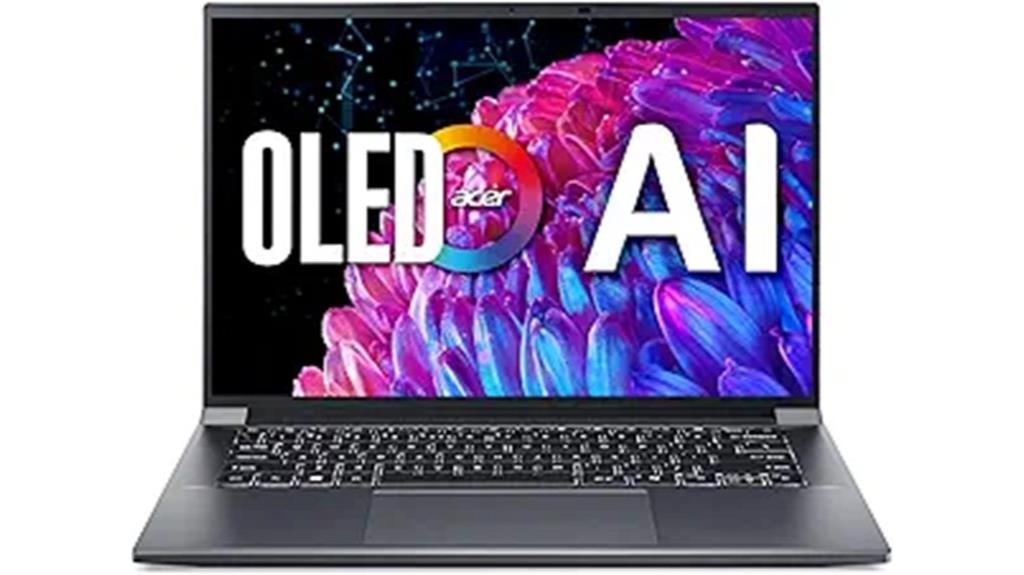
The Acer Swift X 14 Laptop (SFX14-72G-77NJ) is tailored for data scientists who demand exceptional performance and versatility in their tools. With an Intel Core Ultra 7 processor and NVIDIA GeForce RTX 4060 GPU, it effortlessly handles graphically intensive applications while optimizing power consumption. The stunning 14.5-inch OLED display offers vibrant visuals and TÜV Rheinland certification for eye comfort. You’ll appreciate the centralized AI assistance through the dedicated Copilot Key, enhancing your multitasking capabilities. With 16GB RAM and a 1TB SSD, you’re set for fast storage and connectivity thanks to Killer Wi-Fi 6E, ensuring seamless collaboration and efficiency.
Best For: Data scientists and creators seeking powerful performance, exceptional display quality, and advanced AI assistance for enhanced productivity.
Pros:
- Powerful Performance: Equipped with an Intel Core Ultra 7 processor and NVIDIA GeForce RTX 4060 GPU, ideal for running demanding applications.
- High-Quality Display: 14.5-inch OLED display with a 2880 x 1800 resolution and TÜV Rheinland certification for reduced eye strain.
- Advanced Connectivity: Features Killer Wi-Fi 6E and a microSD card reader for seamless collaboration and multitasking.
Cons:
- Limited Upgrade Options: The internal components may not be easily upgradeable due to their design.
- Weight and Portability: Being a powerful laptop, it may be slightly heavier than ultra-portable models.
- Price Point: Higher performance specifications may come at a premium cost, which might not fit all budgets.
Apple 2025 MacBook Air 15-inch Laptop with M4 Chip
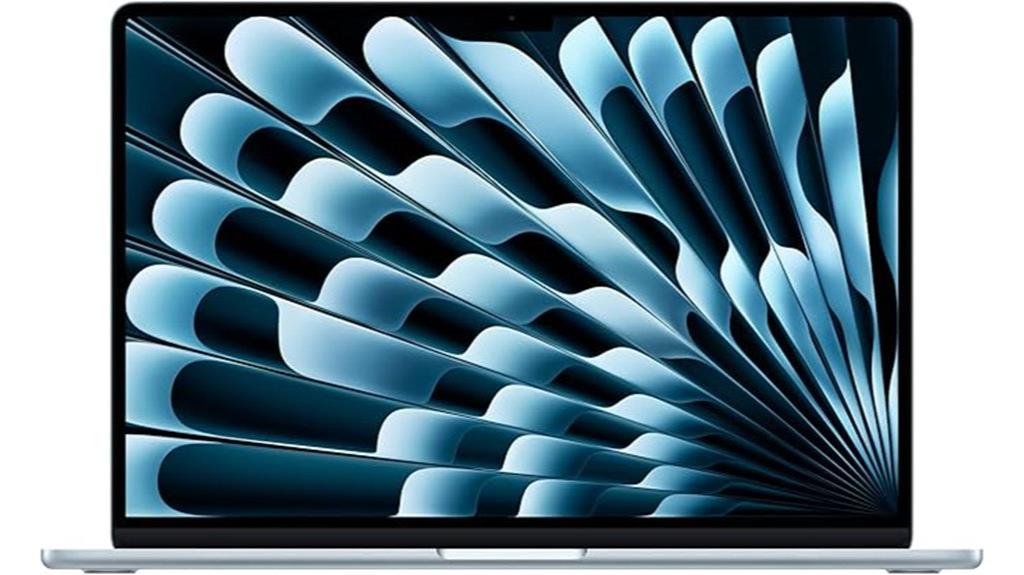
For data scientists seeking a powerful yet portable machine, the Apple 2025 MacBook Air 15-inch with the M4 chip stands out. Its impressive performance ensures smooth multitasking, video editing, and gaming, all while boasting up to 18 hours of battery life. The stunning 15.3-inch Liquid Retina display supports 1 billion colors, offering vibrant visuals for your data projects. Equipped with a 12MP Center Stage camera and Spatial Audio, it enhances your virtual meetings. With two Thunderbolt 4 ports and robust connectivity, you can easily connect multiple displays. Plus, Apple’s emphasis on privacy keeps your sensitive data secure.
Best For: Data scientists and professionals who require a powerful, portable laptop for intensive tasks and secure data management.
Pros:
- Enhanced performance with the M4 chip for multitasking and video editing.
- Stunning 15.3-inch Liquid Retina display supporting 1 billion colors.
- Long battery life of up to 18 hours, perfect for on-the-go work.
Cons:
- Limited to two Thunderbolt 4 ports, which may be insufficient for some users.
- Higher price point compared to other laptops in the market.
- May not be ideal for users who prefer Windows-based software ecosystems.
ASUS Vivobook S 14 OLED Slim Laptop (M5406WA-DS76)
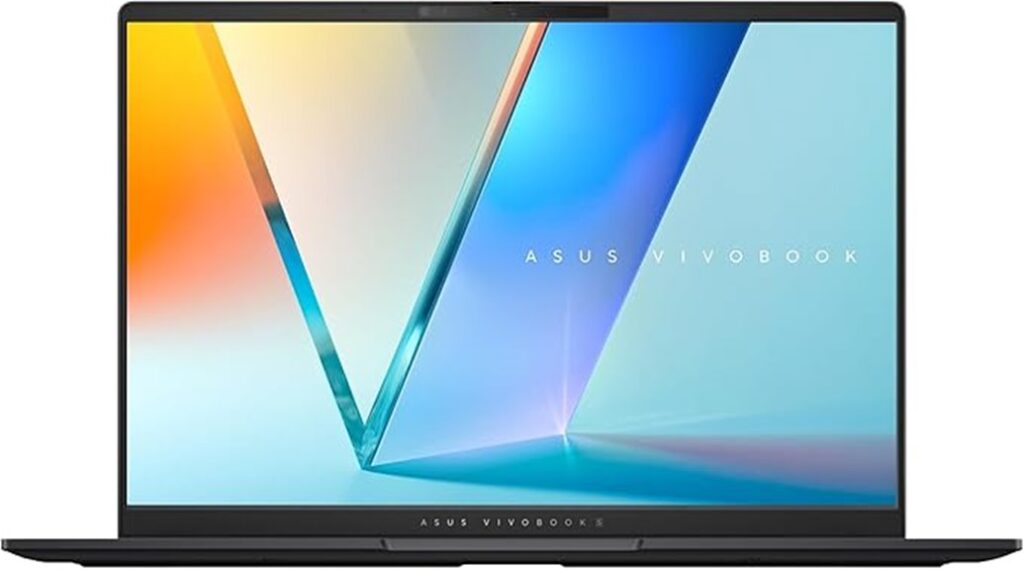
Engineered for data scientists who demand high performance and stunning visuals, the ASUS Vivobook S 14 OLED Slim Laptop (M5406WA-DS76) stands out with its powerful AMD Ryzen 9 365 processor. With 24GB LPDDR5X RAM and a 512GB SSD, you’ll handle large datasets effortlessly. Its 14″ 3K OLED display offers vibrant colors and impressive brightness, making your data analysis more engaging. Weighing just 2.87 lbs and only 0.63” thick, it’s ultra-portable. Plus, the customizable RGB backlit keyboard enhances your ergonomic typing experience. Connectivity options like USB 4.0 and HDMI 2.1 ensure you’re equipped for all your data science needs.
Best For: Data scientists and professionals seeking high-performance computing with stunning visuals and portability.
Pros:
- Powerful Performance: Equipped with an AMD Ryzen 9 365 processor and 24GB LPDDR5X RAM for handling large datasets efficiently.
- Vibrant Display: The 14″ 3K OLED screen provides exceptional color accuracy and brightness, enhancing data visualization.
- Ultra-portable Design: Lightweight and slim profile make it easy to carry for on-the-go work.
Cons:
- Limited Storage: The 512GB SSD may fill up quickly with large datasets and applications.
- Single-zone RGB keyboard: Customization options are limited compared to more advanced multi-zone keyboards.
- No dedicated graphics card: Integrated graphics may not be sufficient for intensive graphic tasks like gaming or heavy 3D rendering.
Samsung Galaxy Book4 Pro Business Laptop (NP944XGK-KG4US)
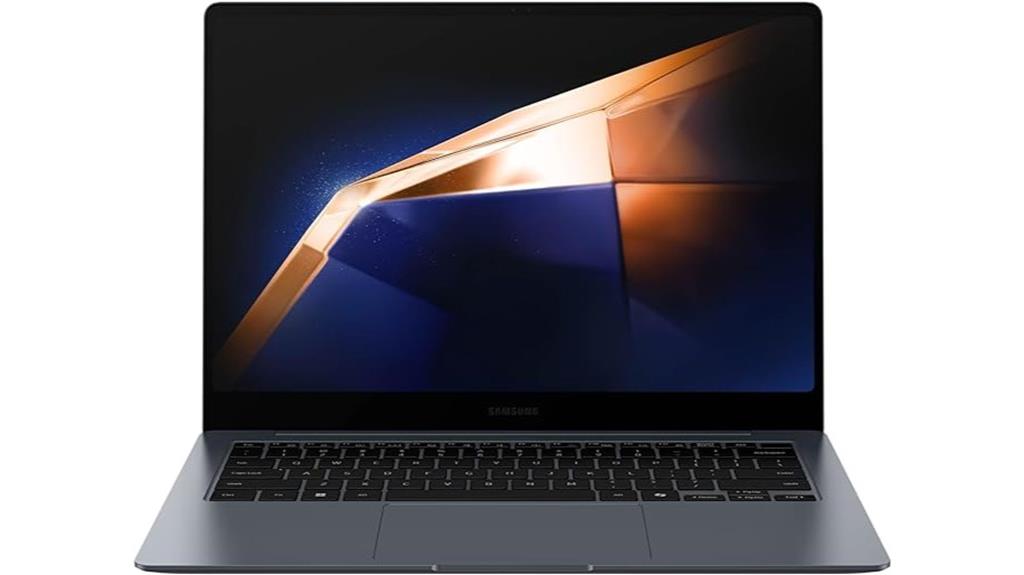
Designed with data professionals in mind, the Samsung Galaxy Book4 Pro Business Laptop (NP944XGK-KG4US) stands out with its impressive 32GB of LPDDR5 RAM and powerful Intel Core Ultra 7 processor. This 14-inch laptop features a stunning 3K AMOLED touchscreen, making data visualization a breeze. Weighing just 2.71 lbs, it’s portable enough for your on-the-go lifestyle. With 1TB SSD storage and robust connectivity options, including Thunderbolt 4 ports, you’ll effortlessly multitask and collaborate. Its sleek design and excellent battery life of up to eight hours ensure you stay productive throughout your day. Security features like Samsung Knox keep your data safe.
Best For: Professionals seeking a lightweight, high-performance laptop with advanced security features for multitasking and data management.
Pros:
- Exceptional display quality with a 3K AMOLED touchscreen for vibrant visuals.
- Ample 32GB RAM and 1TB SSD storage for efficient multitasking and data handling.
- Sleek and portable design makes it ideal for on-the-go professionals.
Cons:
- Higher retail price compared to competitors with similar specifications.
- Limited RAM upgrade options in certain regions (max 16GB).
- Perceived low quality of OEM SSD from Western Digital for the price point.
READ MORE: Best Laptop for Influencers, Best Laptop for Excel Spreadsheets, Best Laptop for Dropshipping Busines, Best Laptop for Data Science Students, Best Laptop for Data Engineer, Best Laptop for Blogging and Podcasting, Best Laptop for Dental School, Best Laptop for Grandma, Best Laptop for Full Stack Developer, Best Laptop for Fruity Loops
Factors to Consider When Choosing the Best Laptops for Data Scientists
When choosing a laptop as a data scientist, you’ll want to consider several key factors. Think about the processing power, RAM capacity, and storage speed that can handle your workload efficiently. Don’t forget about display quality and battery life, as these can significantly impact your productivity.
Processing Power Requirements
Choosing the right laptop for data science means understanding the processing power you’ll need to tackle demanding tasks. Look for laptops equipped with multi-core processors like the Intel Core Ultra or AMD Ryzen. These processors efficiently handle complex computations and large datasets. A high-performance GPU, such as the NVIDIA RTX series, is crucial for accelerating deep learning and data visualization tasks. Fast storage options, specifically SSDs with at least 512GB, will ensure quick data access and minimal load times during processing. Additionally, consider laptops that offer specialized AI capabilities or enhanced processing features to optimize performance for model training and parallel processing. These elements are vital for making your data science work efficient and effective.
RAM Capacity Considerations
Processing power is just one piece of the puzzle; RAM capacity plays a significant role in a data scientist’s workflow. For optimal performance, you should aim for at least 16GB of RAM, especially when dealing with large datasets and complex computations. If you tackle advanced tasks, consider 32GB or more. High RAM capacity enables better multitasking, allowing you to run multiple applications simultaneously without lag. Tools like TensorFlow or PyTorch are particularly RAM-intensive, benefitting from increased memory for model training and data manipulation. Insufficient RAM can lead to excessive data swapping, slowing down your analysis significantly. Investing in higher RAM not only enhances your current work but also future-proofs your laptop for larger datasets and evolving software demands.
Storage Speed and Size
As you dive into the world of data science, the importance of storage speed and size can’t be overstated. You’ll need a minimum of 512GB SSD storage to handle large datasets, software, and project files without constantly relying on external drives. SSDs provide much faster read and write speeds than traditional HDDs, which boosts data processing times and enhances your workflow. This speed is vital for tasks like machine learning model training, where loading times can make all the difference. Choosing laptops with expandable storage options allows you to upgrade as your project demands grow. Plus, fast storage solutions support multitasking, enabling you to run several applications simultaneously without system slowdowns. Prioritize storage wisely!
Display Quality and Size
A high-quality display is essential for any data scientist, as it directly impacts your ability to analyze and interpret data effectively. Look for a resolution of at least 2880 x 1800, ensuring that your data visualizations and graphs are sharp and clear. A larger screen, ideally between 14 to 15 inches, offers ample workspace for multitasking with multiple applications and datasets. High refresh rates, such as 120Hz, enhance scrolling smoothness through data-heavy applications, making your work more efficient. Additionally, consider displays with TÜV Rheinland certification to reduce eye strain during long hours. Finally, a wide color gamut (100% DCI-P3) guarantees accurate color representation, crucial for effective visual data analysis and presentations.
Battery Life Expectations
When selecting a laptop for data science, battery life is a crucial factor that can significantly impact your productivity. You’ll want a laptop that offers at least 8 to 18 hours of battery life, allowing you to tackle long coding sessions, data analysis, and model training without constantly searching for an outlet. Laptops equipped with efficient processors, especially those with advanced AI capabilities, can optimize battery consumption during demanding tasks. If you work remotely or travel often, strong battery life ensures an uninterrupted workflow, perfect for presentations or fieldwork. Look for models with fast charging features, as they can provide significant usage time in a short period, helping you maintain consistent performance even during data-intensive tasks.
Portability and Weight
Portability and weight are essential factors for data scientists who often find themselves working in diverse environments. You’ll want a laptop that’s lightweight, ideally under 3 pounds, making it easy to carry around. A slim profile, around 0.6 inches thick or less, will fit nicely in your bag without adding bulk. Battery life is crucial too; look for models that offer at least 8 to 10 hours of usage, ensuring you can work uninterrupted away from outlets. A screen size of 14 to 15 inches strikes a balance between providing a good viewing area while remaining portable. Finally, ensure the laptop has a robust build quality and durable materials to withstand the rigors of travel and frequent use.
Connectivity Options Available
Having the right connectivity options can significantly enhance your efficiency as a data scientist. Look for laptops equipped with multiple USB ports, including USB Type-C, to easily connect external hard drives and essential tools. An HDMI port is crucial for linking to external displays or projectors, making presentations and data visualization smoother. Consider models with Thunderbolt 4 ports for high-speed data transfer and the ability to support multiple displays. A microSD card reader can also be invaluable for managing large datasets directly from cameras. Finally, ensure your laptop has wireless capabilities like Wi-Fi 6E or Bluetooth 5.3 to guarantee fast internet access and seamless communication with your wireless devices.
Frequently Asked Questions
What Is the Ideal Screen Size for Data Science Work?
For data science work, you’ll want a screen size between 15 to 17 inches. This range balances portability and visibility, allowing you to analyze data efficiently without straining your eyes during long sessions.
How Important Is Battery Life for Data Scientists?
Battery life’s crucial for data scientists. You need a reliable laptop that lasts through long analysis sessions and fieldwork. A short battery can disrupt your workflow, so prioritize laptops with extended battery performance.
Can I Run Multiple Applications Simultaneously on These Laptops?
Yes, you can run multiple applications simultaneously on these laptops. With powerful processors and ample RAM, they handle heavy workloads efficiently, ensuring smooth performance whether you’re coding, analyzing data, or visualizing results.
Which Laptop Has the Best Cooling System for Heavy Tasks?
When tackling heavy tasks, look for laptops with advanced cooling systems, like liquid cooling or multiple fans. These features help maintain performance by preventing overheating, ensuring you can run demanding applications smoothly without interruptions.
Are There Budget-Friendly Options for Data Science Laptops?
Yes, you can find budget-friendly laptops for data science. Look for models with decent processors, at least 16GB RAM, and SSD storage. Brands like Acer and Lenovo often offer great value without sacrificing performance.
My Final Opinion
In conclusion, choosing the right laptop is crucial for data scientists who need power and performance. The models we’ve highlighted, like the Apple MacBook Pro and Acer Swift X 14, cater to diverse needs and preferences. When selecting your laptop, consider factors like processing power, RAM, and portability to ensure it meets your workload demands. With the right device in hand, you’ll be well-equipped to tackle any data challenge that comes your way.
